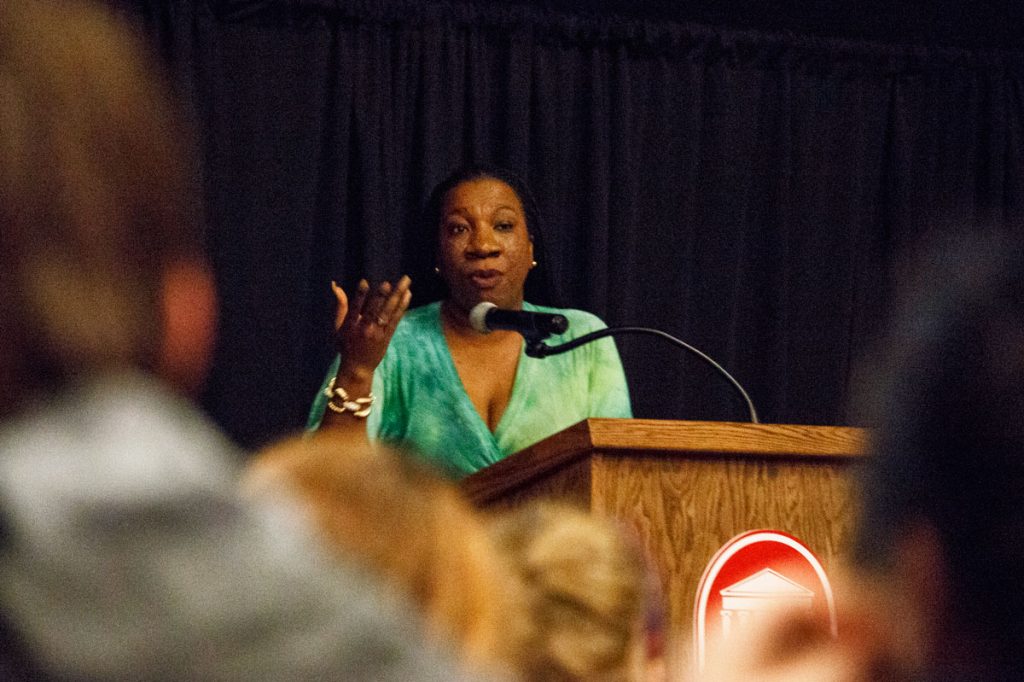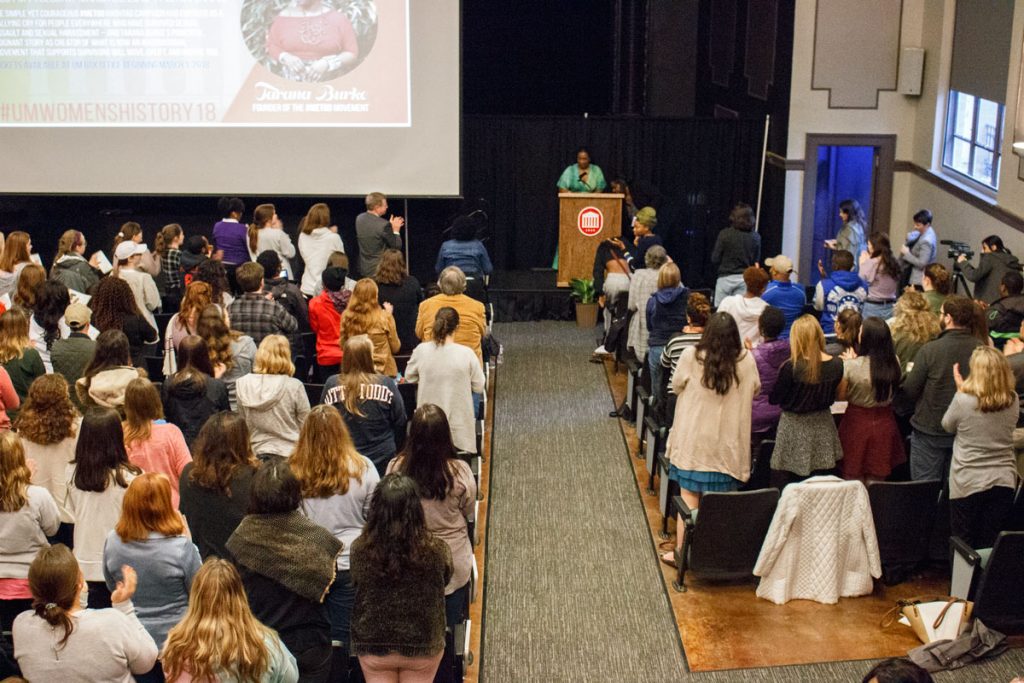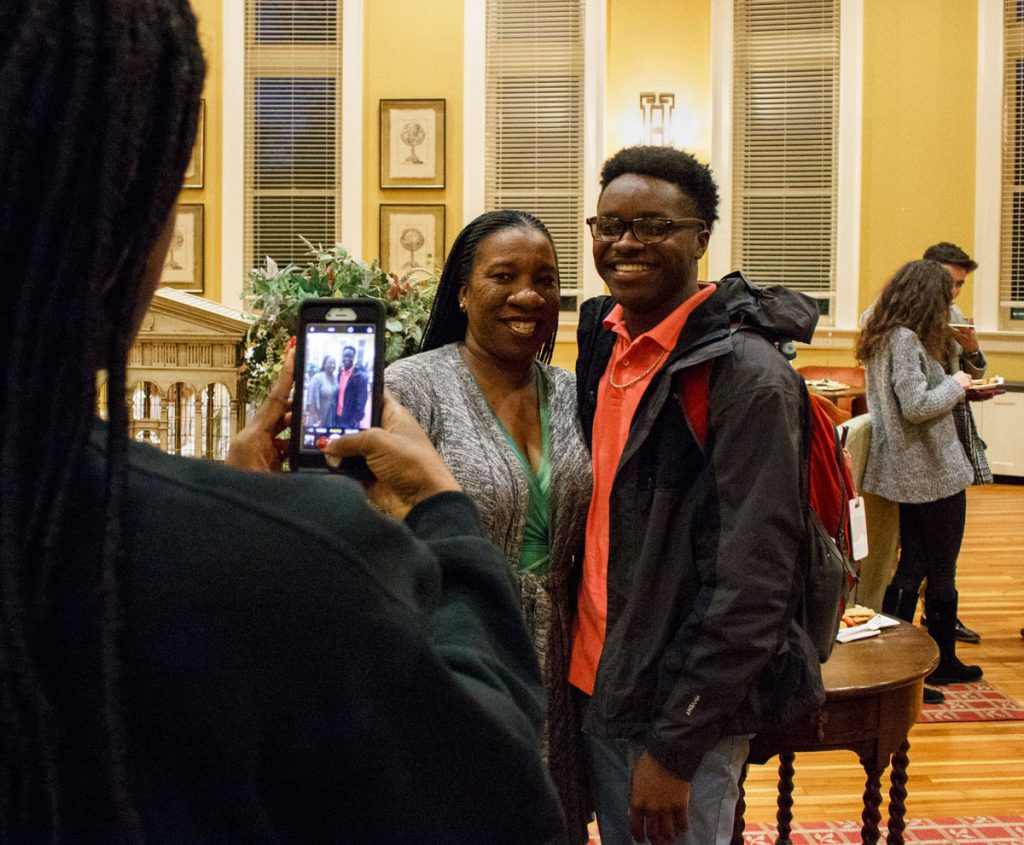Activist Tarana Burke has dedicated more than two decades of her life to social justice and laying the groundwork for what would eventually become the viral #MeToo Movement.
Burke shared her story of how the movement came to be and clarified common misconceptions about it during the Women’s Empowerment Keynote Address in Fulton Chapel Tuesday night.
She said strong black and feminist influences were around her from an early age, coming mostly from her mother and grandfather.
“When I say my family was radical, I mean we had a birthday cake on Malcolm X’s birthday,” she laughed.
Burke found that the one missing piece in the cultural knowledge she had of what it means to be a black woman in America was how to take her knowledge and actively use it to change her community for the better.

Tarana Burke, founder of the #MeToo Movement, delivers the 4th annual Women’s Empowerment Keynote Address in Fulton Chapel Tuesday night. She created the movement to give a voice to survivors of sexual assault. Photo by Billy Schuerman
When she was 14, Burke joined the 21st Century Youth Leadership Movement, a group of civil rights activists based in Selma, Alabama, looking to pass their skills in leadership on to the next generation.
“Their purpose was to train up grassroots community organizers, and that’s what they did in me,” Burke said.
At that early age and into her time at Auburn University, she organized events centered around a variety of issues, from the nationally-covered Central Park Five case of 1989 to issues local to her college campus.
The five convicted men sued New York City in 2003 for malicious prosecution, racial discrimination, and emotional distress.
Not until Burke met a girl whom she pseudonomically refers to as “Heaven” did she begin to focus her efforts on the issue of sexual assault. Heaven was a camper at the 21st Century Youth Leadership Movement summer program when Burke, 22 at the time and a sexual assault survivor, was a counselor.
“When that baby came and cornered me and started to spill all of this stuff about what she had suffered at the hands of her mom’s boyfriend, I shut her down,” Burke said.
Burke said she had shut Heaven down because she was scared of saying something wrong or giving her wrong advice. She later realized that all she needed and wanted to say to Heaven in that moment of silence was, “This happened to me, too.”
Burke recognizes this memory as one of the most important in leading her to found the ever-growing #MeToo Movement.
“Whatever I had to do not to fail another brown girl looking me in my face, I would do that. #MeToo was essentially born in that moment,” she said.

Students and members of the community give Tarana Burke a standing ovation after she speaks about the #MeToo movement she created and how it gives a voice to survivors of sexual assault. Photo by Billy Schuerman
Burke said since the #metoo hashtag went viral after actress Alyssa Milano’s tweeted it last October, too many misconceptions about the movement have been fed to people through mainstream media.
Burke said one of the common misconceptions is that the movement’s goal is to remove men from power.
“The taking down of powerful men is the corporate response to #MeToo,” she said, using Harvey Weinstein and Kevin Spacey as examples.
Burke also said the movement is about eliminating sexual harassment and assault everywhere, not just in the workplace, even if that is the easiest place to start making changes.
“It’s not about just changing a policy or doing something different in HR and shoring up your EOC or your Title IX. It’s about human beings,” she said.
Freshman Mary Day attended the speech and said she appreciated how Burke connected the widespread #MeToo movement to recent life on college campuses.
“I had heard about the movement beforehand, but I really did not know as much as I thought I did about it. I thought what she had to say was very powerful because she explained the movement in a way that was easy to understand and related directly to our college campus,” Day said.

Jarrius Adams (right) takes a photo with Tarana Burke, creator of the #MeToo movement, at the reception in Bryant Hall after the Keynote Address. Burke created the movement as a way to give survivors of sexual assault a chance to speak out. Photo by Billy Schuerman
Burke ended her remarks reminding the audience members, male or female, survivor of assault or not, of their right to safety and protection on the Ole Miss campus, in the United States and beyond.
“You have to hold your school responsible,” she said. “Community problems have to have community solutions, and on a college campus, those solutions should be built around you.”






